Impressions From Gandhi 3.0
[Earlier this year, I joined the Gandhi 3.0 retreat in India, with ServiceSpace friends from around the globe. Just as I returned back to Australia, I penned down these thoughts to share with retreat participants.]
The nature of such a brief but indelibly printed time together is that your memories bubble up unpredictably, in snapshots, brief scenes, during meditation, prompted by an item in hand, a fragrance, a tune "All that I am, all that I see…."

Etihad Flight from Melbourne to Ahmedabad. Owned by UAE, each seat-back movie screen on the plane has available upon demand a Mecca pointer, with an electronic compass needle pointing towards Mecca, so that no matter what direction the plane is currently heading, you can tell immediately how to find the East, and Mecca. There is count-down timer telling you how many hours remain until the next scheduled prayer time. What a marvelous way to keep track of your relationship with the spiritual, even in flight. Truly “everything is speaking the Dharma, if only our ears can hear it.”
A female flight attendant named Shanti introduces herself. She takes the details of my veggie meal, then come back later and asks politely about my robe and what it represents. Before long her supervisor, Jai, introduces himself and makes small talk about diet and spiritual values. He asks me whether I might be willing to speak briefly with Shanti in the lounge area of the plane. It seems she has some personal questions that she wants to discuss. Of course I am willing. I’m also curious: this is the first request for Dharma while in-flight on board a plane.
Etihad has won the coveted #1 spot among international airlines for seven years in a row and part of the reason might be because of the softly lit conversation lounge in the front of the plane. It’s almost enough to let you forget your actual situation. Jai brings Shanti over and tells her, "I'll cover for you while the two of you talk."
Shanti is an Indian woman from Delhi whose father and husband do not see eye to eye. Her father has mental challenges and sometimes behaves unpredictably. Her method of dealing with her father, who doesn’t always respond rationally, is to love him unconditionally and to use gratitude and kindness to bring him around when he goes astray. Her husband hasn’t accepted her relationship with her father. The husband wants to reprimand him and point out where he must change. Conflict arises from their different methods of dealing with this situation. Her husband’s family loves Shanti and has fully bonded with her as their daughter. I ask how her husband and his own father get along, and the answer is "not well, always with friction."
I tell Shanti about Confucius’ method of treating all elders as if they were your own parents, and repaying their kindness with gratitude, just as if they were your own parents. Since her new parents in law love Shanti as their daughter, perhaps if she can treat her husband’s father with the same unconditional love and respect, her husband will see by her example, the effect that attitude has on a family. Shanti gets the idea immediately, is pleased and sees an open door ahead. She places her palms together to her supervisor for the chance to hear the Dharma of repaying parents’ kindness, at 35,000 feet!
My Gandhi 3.0 retreat is off to a great start.
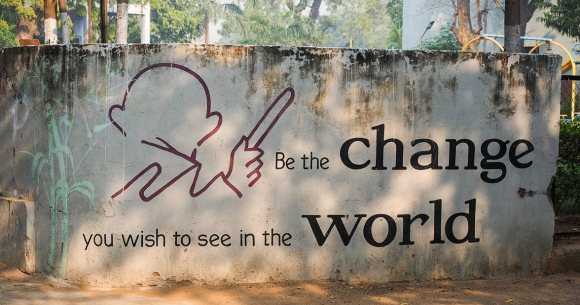
Guri Mehta and Parag Shah meet me at airport. Guri looks gracious and calm, deeply focused in Tiger-samadhi, seemingly as much in control she is home in Berkeley. My two bags and guitar magically disappear and reappear in Parag’s hands before I realize what has happened.
We arrive at ESI, the Environmental Sanitation Institute in Sughad, Gujarat. We are greeted Indian style, which includes drumming, dancing, hand-clapping, songs, a flower wreath and a bindi dot on the third eye. What a splendid and joyful greeting. I reflect on my Irish-Canadian roots, where a handshake and a hearty “So glad you’ve come. Welcome. Let me take your coat, cold enough for you?” is our reserved version of the greeting. Never drums or flowers, and you keep your third eye closed tightly, for fear of seeming impolite.
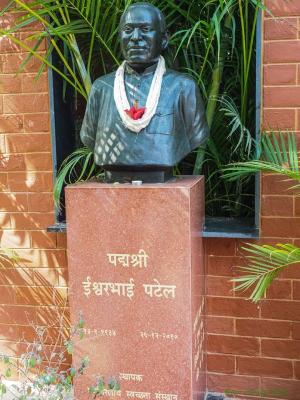 First stop: the statue of Ishwar-bhai, Jayesh-bhai’s father, the guiding light of ESI, and one who received a direct Dharma-transmission from Gandhi himself, to “deal with the matter of sanitation in India.” This extraordinary man who raised his family including our host, Jayesh-bhai, in the Gandhi Ashram, truly followed Gandhi in making his life his message. The statue greets us and we pay respects as we would be entering the home of the host. Ishwar-bhai’s passion for sanitation and reform improved the lives of millions of Indians, particularly “untouchable” scavengers, and his courage in changing deep prejudices impressed me. A Bodhisattva in the flesh, whose beloved nickname “Big Toilet” came from his life-long commitment to embodying the maxim: “cleanliness is next to godliness.”
First stop: the statue of Ishwar-bhai, Jayesh-bhai’s father, the guiding light of ESI, and one who received a direct Dharma-transmission from Gandhi himself, to “deal with the matter of sanitation in India.” This extraordinary man who raised his family including our host, Jayesh-bhai, in the Gandhi Ashram, truly followed Gandhi in making his life his message. The statue greets us and we pay respects as we would be entering the home of the host. Ishwar-bhai’s passion for sanitation and reform improved the lives of millions of Indians, particularly “untouchable” scavengers, and his courage in changing deep prejudices impressed me. A Bodhisattva in the flesh, whose beloved nickname “Big Toilet” came from his life-long commitment to embodying the maxim: “cleanliness is next to godliness.”
By putting into practice the lessons in selfless service he learned from Gandhi, Ishwar-bhai found the inspiration to joyfully do things that nobody else wanted to do in the process, touching hearts and changing minds.
Nipun and Jayesh-bhai took me to the Buddha image recently installed on the grounds, and invited me to bow and to offer a candle. By honoring the spirit of filiality, and showing respect to ancestors, the hosts made me feel spiritually welcome, secure and supported in two traditions. Showing courtesy the old-fashioned way, correctly, and with propriety, made me feel settled and grounded, respected and relaxed. With the foundation set in, now the jeweled pagoda could be built high indeed!
I was installed in a kuti, a monk’s hut; designed to be everything a monastic needed and nothing unnecessary. Every surface offered a chance for artistic expression; every tree branch offered a space for a clay birdhouse, every wall hosted a school of ceramic fish or a saying. Every toilet/WC had a name, an inspiring saying and a library!
Outside the gate sit three brightly painted rickshaw taxis, operated by Uday, the Ahmedabad No Rickshawalo, who is “spreading joy, one ride at a time.” He operates a fleet of rickshaws just like any other enterprising taxi driver in town, only his drivers do not charge a fixed price for their transportation. They operate on “gift economy” which invites the passengers upon arrival at their destination to contribute what they are moved to give for the next passenger ahead. Their ride has already been paid for by the prior passenger. Uday-bhai has a memory book of photos that he brings out to show me of satisfied passengers, including Amitabh Bachchan, the movie star, past prime ministers of India, Senator Hillary Clinton, and others. When he began his experiment with radical generosity everybody, including his wife, thought he was crazy and would go broke within a year. Instead, to everybody’s delight, his generosity lead to newspaper articles, massive support, a crew of workers and taxis, and work he loves of spreading joy in Ahmedabad, “one ride at a time.”

First morning rising to catch the slanting sunlight illuminating the large meditation pool at the edge of the property, near my cottage. I grab my camera and look closer. All around the pool perhaps one hundred yards in all, are hand-painted figures, doing three steps, one bow, the circumference of the pool. Astonishing! Even more so is the reality that every retreat includes a group bowing pilgrimage, with the practice of making ritual prostrations coming up as the “best part” of past retreats. Bodhi Svaha!
I marvel at Sheetal Sanghvi’s generosity. We get along immediately in the back seat of a car moving through Ahmedabad traffic, we find ourselves deep in a conversation about the subtleties of the mind while bowing or in repentance. Ordinarily a run through Indian traffic brings me to nail-biting anxiety, or complete spiritual surrender. Today the conversation with Sheetal leaves us both feeling refreshed and energized, live having tasted satisfying food.
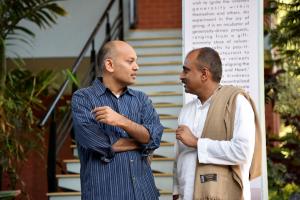 As much as Nipun is the sunlight that powers the inspiration for ServiceSpace, Jayesh-bhai is the heart that keeps the blood of ServiceSpace circulating. His smile is captivating, mischievous, as if he is one step ahead of you at every turn, but too kind to remind you of it. He’s waiting for a chance to show you a heart-opening principle, make you feel that you’ve discovered it for yourself and do it all with a twinkle and a hug.
As much as Nipun is the sunlight that powers the inspiration for ServiceSpace, Jayesh-bhai is the heart that keeps the blood of ServiceSpace circulating. His smile is captivating, mischievous, as if he is one step ahead of you at every turn, but too kind to remind you of it. He’s waiting for a chance to show you a heart-opening principle, make you feel that you’ve discovered it for yourself and do it all with a twinkle and a hug.
Met Trishna Shah, an old CharityFocus/Service Space friend from a decade ago, who flew in from London despite having a nasty flu for a week before. Trishna is one of the banner-carriers of the original vision of Service Space, and her background in business administration complements her new job as mother to two brilliant little girls in England.
.jpg)
First a stop at a new Craftroots Folk Arts Collective store, gleaming in the late afternoon sunshine. Boom jingle boom! Another Indian welcome, with drums, flowers, songs, a bindi and bows. In the center of the welcoming crowd stands Anar-ben, Jayesh-bhai’s wife and the inspiration for Gramshree, a ground-breaking native women’s arts collective. Anar-ben goes into the villages to locate folk artists: crafts-people who hand-weave fabrics, make instruments, do metal-work, make quilts, and wood work. She offers to support the artists and their families, provide them a stable income, profit-sharing, health-care and education for the artists and for for their families, and in the process, teaches the village women self-respect. At the same time, Gramshree keeps alive artistic traditions and hand-work preserved in families for centuries, that without support, would not survive urbanization and globalization. Priceless heirloom weaving patterns, designs and fabrics that had only a handful of women knew how to make, now have the recognition of an India-wide audience, markets, students to pass it on to and a stable income. And the hand-woven fabrics themselves are utterly astonishing.
.jpg) I heard stories that both break your heart and uplift it. I met a woman who was a master weaver on a hand-loom, but who lost her entire family in the massive and deadly 2001 Gujarat earthquake. She was the only one of her family of ten who survived and the shock and grief kept her crying for weeks. Anar-ben and Gramshree volunteers carried the woman out of the ruins of her family house, nursed her back to wholeness and now she keeps the crafts alive. She returned to her weaving, improved it with artistic cross-pollination from other weavers, and she now travels throughout the India, demonstrating her work in shows and meeting and recruiting other native artists for their collective. Having overcome her loss with the help of Anar-ben and all her Craftroots sisters, she smiles now from her mended heart.
I heard stories that both break your heart and uplift it. I met a woman who was a master weaver on a hand-loom, but who lost her entire family in the massive and deadly 2001 Gujarat earthquake. She was the only one of her family of ten who survived and the shock and grief kept her crying for weeks. Anar-ben and Gramshree volunteers carried the woman out of the ruins of her family house, nursed her back to wholeness and now she keeps the crafts alive. She returned to her weaving, improved it with artistic cross-pollination from other weavers, and she now travels throughout the India, demonstrating her work in shows and meeting and recruiting other native artists for their collective. Having overcome her loss with the help of Anar-ben and all her Craftroots sisters, she smiles now from her mended heart.
We visited the original ESI where we were greeted by the women students from the villages. Brilliant smiles and confidence from them as they talked about about their school curriculum and what they planned to take back to the villages with them. Madhu came forward to greet us. I last saw him in Salt Lake City with Jayesh-bhai at the Parliament of World Religions in 2015. I heard in detail about Ishwar-Bhai, toured his "Toilet Garden," his "Toilet Cafe," personally inspected the broom designs, and heard so many inspiring stories of how Gandhi's inspiration was put into service right here in Ahmedabad, and then filtered out into India and the world.
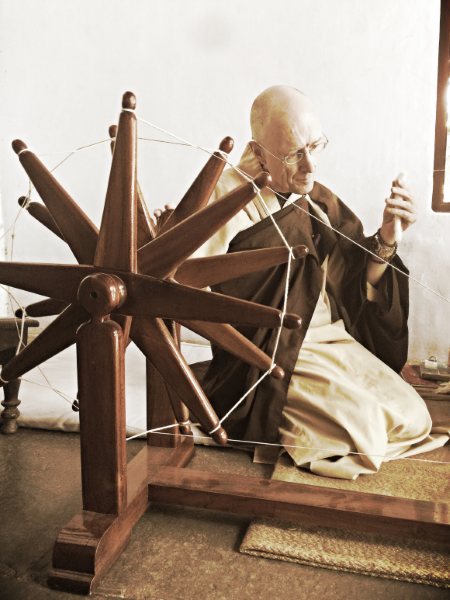 We met the volunteers and heard the stories of Manav Sadhna, the artists, their gifts. Courageous youth who live to make small changes that impact the world. Toured the girls’ school, saw their bright faces and their clean uniforms, and self-respect as they ate lunch. Truly Education for Girls and Women will improve the quality of wisdom in the world in the fastest way. Each shiny new student will return to her village to display her new uniform, her reading skills, her willingness to help with the chores and her respect for elders. Every sibling will want to follow their sister to the school and into the light.
We met the volunteers and heard the stories of Manav Sadhna, the artists, their gifts. Courageous youth who live to make small changes that impact the world. Toured the girls’ school, saw their bright faces and their clean uniforms, and self-respect as they ate lunch. Truly Education for Girls and Women will improve the quality of wisdom in the world in the fastest way. Each shiny new student will return to her village to display her new uniform, her reading skills, her willingness to help with the chores and her respect for elders. Every sibling will want to follow their sister to the school and into the light.
Jayesh-bhai offered me a rare opportunity to chant the Heart of Prajna Paramita Sutra in English in Gandhi’s own room. I envisioned the ripples traveling outwards to fill the cosmos.
Went to SEVA Cafe. Met the volunteers, watched the cooks go last after everybody else had eaten, holding hands in a circle, chanting hymns of gratitude. Deeply moved by their heart of joy in service. Got to dedicate a song to the evening, the mantra that transforms greed!
“I have enough, I am grateful, share the blessings, Hallelujah! May all be fed, may all things flourish, may all awaken, Bodhi Svaha!”
Lucy the cat meows me outside, then flashes up a tree to stare down at me, showing off her high-altitude acrobatic skills. Cobras and owls live here at peace, rafters are left exposed so that the local parrots and pigeons can roost among the humans.
Kishan the translator and Bhaskar the nature photographer and chef at SEVA Cafe stop by to show me Bhaskar’s bird and flower photos. Outstanding work!
Bhaskar’s mother, while working as a custodian at an elementary school, made it her practice to pick up all the tiny stubs of pencils that students discarded. She saved every one, sharpened them carefully and gave them to slum children who had never owned a pencil before. She put in their hands the tool for gaining education and knowledge. Her future retribution: she and her children will always encounter chances to learn and study, because she gave that gift freely to others. Doors to schools and books will open to her!
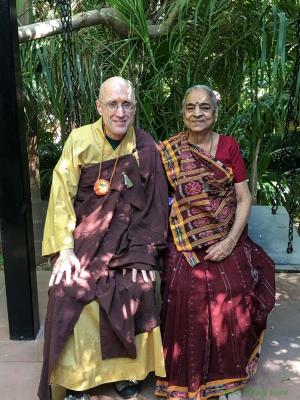 Lunch with Jayeshbhai’s mom when she brings special foods she has cooked for me and wrapped in newsprint with twine. I ask her humbly to accept me as her son in a future life. She pats my head and accepts! I ask her why do mothers who raise up sons to love them then allow those sons to pick up a rifle and go out to make war? Why don’t the mothers stop them? She answers immediately, “Mothers raise their sons to think for themselves. They try to instill proper values in all their children. When the sons have points of view that differ from their mother’s, the mothers can only speak their opinion. They cannot force their children to agree with them or to obey, if they disagree. That’s how they are raised, to think on their own.”
Lunch with Jayeshbhai’s mom when she brings special foods she has cooked for me and wrapped in newsprint with twine. I ask her humbly to accept me as her son in a future life. She pats my head and accepts! I ask her why do mothers who raise up sons to love them then allow those sons to pick up a rifle and go out to make war? Why don’t the mothers stop them? She answers immediately, “Mothers raise their sons to think for themselves. They try to instill proper values in all their children. When the sons have points of view that differ from their mother’s, the mothers can only speak their opinion. They cannot force their children to agree with them or to obey, if they disagree. That’s how they are raised, to think on their own.”
I see the wisdom and bow to her, as a son of a mother who raised me to be an independent thinker. When she asked me not leave home to be a monk, I did it anyway, against her wishes. Point taken.
During the morning sessions, I speak of education by activating inherent wisdom, Master Hsuan Hua’s vision of virtue-education based on filiality and deep immersion in the Great Books of the West and East.
Bhumika, one of the hard-working volunteers brings out her guitar and sings a Kris Kristofferson song: “Here Comes That Rainbow Again,” citing me as the inspiration for learning the song. I tell the story of the song, arising from Kristofferson’s admiration for John Steinbeck’s “The Grapes of Wrath.” The joy of paying it forward moistens every eye in the room.
Ketan the photographer and director of the photographer’s club of India visits my room to look at my nature photos from Australia. As soon as I remove a lens from my camera he corrects my technique, leaving the sensor on the camera open, pointing up, and vulnerable to catching specks of dust, a no-no in basic photographic technique. When I hold my camera with a heavy telephoto lens attached, by the body, KV corrects me and advises that I hold it underneath the lens, to avoid straining the fragile lens mount. I realize that he is giving me a master class in proper camera technique -- an invaluable lesson in basic camera maintenance. How can I take fine photographs if I don’t know the fundamentals of sustainable camera use? A true teacher, with old-school principles to share. He invites me on a photo-safari to India’s tiger sanctuary in my next visit to India!
Guri-ji supervised all my physical needs from start to finish. Abbha cooked and served my lunch with abundant care, introducing me to cinnamon and tulsi to warm up my cold vegan digestion. I could not have been better looked-after. Nimo (Nimesh) Patel took the time to squeeze up a veggie smoothie for me in his own kitchen next to the Gandhi Ashram, pour it into a thermos and run it back to my room, four out of five days. He checked the ingredients with me and made sure the left-over was refrigerated. Such persistent, personal care of my diet really touched my heart.
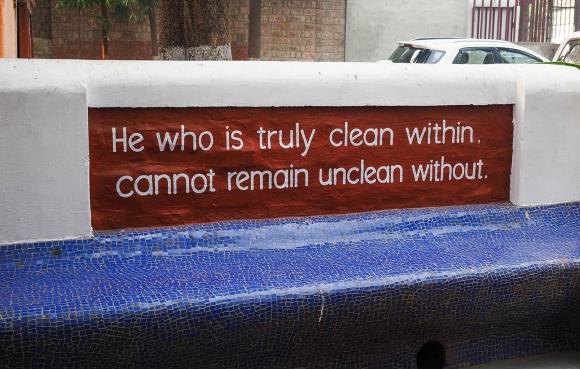
During my visit to Manav Sadhna, Nimo mentioned his local neighborhood grannie who sweeps the street outside his apartment every single day. Her broom makes a “swoosh, swoosh” sound. Nimo and I both instantly hear the rhythm for a song, “Sweep Clean” in his imitation of her sweeping noise. The morning of the final day, Nimo dropped by with another fresh smoothie and we pulled out a writing pad and a guitar and roughed out a song about sweeping the street outside and sweeping clean the mind inside.
“Sweep clean, move the leaves, sweepin’ the ground,
Sweep clean, every step, closer to god,
Sweep clean, every day removing the dirt,
Sweep clean, year by year, cleansing the mind….”
After deciding on the chorus I step into the bathroom to brush my teeth. When I come out, minutes later, Nimo says, “What do you think of this?” He has an entire verse lined out in hip-hop rhythm, and it fits perfectly. Lyric genius, on demand, like turning on a creativity tap and watching the water flow. I’m astonished.
We invite in Bhumika to provide vocal backing on the chorus and perform the song in the morning session before our bowing practice. First time through, the song has promise!
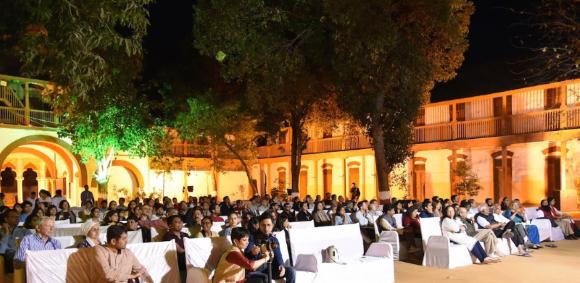
On the next to last night the entire retreat visits the Gandhi Ashram, enjoys dinner and then walks across the street for an evening program. The experience of singing in a courtyard across from Gandhi Ashram, (where Gandhi housed the freedom fighters) a choir of school girls, dramatically lit, newly re-decorated and brought to life. A public event, way past my jet-lagged bed-time, Sister Lucy and Sraddhalu-ji and I invited to sit in the center, facing everybody, in the spotlight, on display, invited to contribute at the end of the program. Time to dig deep for the strength to sit up straight! Hearing from Rahul about the history of this space, hearing from Sister Lucy about the moment of tragedy that turned this quiet nun into the “Mother Teresa of Pune.” Hearing Sraddhalu turn into Sri Aurobindo before our eyes, as he conveys his teacher’s prophetic vision for a evolved humanity through education and fostering our potential for connection with all life forms.
The hard-working sound board audio guy behind the stage at the Ashram comes over to look at my guitar. He is scowling, no-nonsense. I watch his eyes size up my equipment, touching the pickup and asking whether I have a quarter-inch cable. I show him my six-foot cable I brought on Nipun’s advice to be prepared. The audio guy scowls again then walks away. He returns with a thirty foot cable plugged in directly to the mixing board and he gives me the high sign, “try it.” He gets it right the first try, and I adjust my volume. Sounds ready.
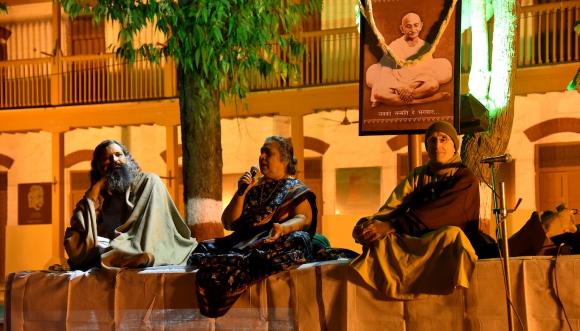
I had a choice of three songs that might fit the evening program. It was Lunar New Year’s Eve, my part of the East Asian world was celebrating with family, the biggest holiday of the year. As a Buddhist we always reserve most of Lunar New Year to pay respects of Maitreya Bodhisattva, whose birthday falls on the same day. I had a fine song prepared, and a Dharma-teaching on the perfection of patience, the patience mantra, to go along with the song. I had that song ready. But on impulse I thought, Jayesh-bhai and his father taught sweeping clean, the picture everybody loves of Ishwar-bhai is him holding a broom, the same with Gandhi. The image of Gandhi painted on the wall of the main gate to the ESI is Gandhi with a broom, sweeping. Since we will be doing three steps, one bow tomorrow, why not put those ideas together and teach the repentance verse from Samantabhadra Bodhisattva, which I recited with each bow for three years? That song is also ready to go. It’s about sweeping the mind clean, and the body, and the mouth.
On the spot I dropped the Maitreya program and decide to go with the Repentance Verse from the Avatamsaka Sutra.
Everybody else had spoken, I was the closer to the evening. It was already past 9:00 PM, so I silently promised myself to practice compassion and cut my part back to the essentials. Rahul-bhai introduced me, I introduced the song, ran through the lyrics and then strummed the guitar. The instrument resounded instantly in the courtyard, filling the space and echoing into the open night sky. I thought, “Master Hua predicted that Westerners would bring the Buddha Dharma back to India, back to its source from the West, but who could have guessed that the Dharma would return via an English translation of the Avatamsaka Sutra, set in a melody by Gordon Lightfoot, accompanied on a carbon-fiber guitar that sounds this good?”
“For all the harmful things, I’ve done, with my body, speech and mind, from beginning-less, greed, anger and stupidity, through lifetimes without number, to this very day, I now repent and I vow, to change entirely.”
I gave a thumbs up to the sound man who grinned at me from the corner of his eyes, then nodded his head one time. “Bingo.”
That’s how audio support is done in Ahmedabad.

Knock on the door at 7:00 AM. “Rev. Sure? Tea here.” “That’s lovely, thank you.” Five minutes later I finish meditation and stand up, open the door to find Vinit standing there with a cup of Tulsi tea on a tray, smiling patiently.
Me: “I had no idea you were still here. I thought you had gone back to the kitchen. I’m so sorry to make you wait outside.”
Vinit: “Not a problem. I was waiting for a chance to pay respects in person. Good morning, and enjoy your tea.”
Returning to airport with Sam and Audrey. She keeps her dazzling smile and open curiosity all the time, not just when she’s in the Service Space spaces. Her genuine ocean-deep kindness is open and available to engage people with joy every minute. She turns the uptight, intimidating security guard, in full uniform, with beard and machine gun, into a friendly neighbor with a boyish grin and a gentle neck wobble head-bob, in answer to Audrey’s bubbly laughter. He stands twice her height, towering over her, but she has turned him into her protective brother, eager to do whatever it takes to get her to smile at him again. The old bearded patriarch, full of male dignity and protocol, crinkles his eyes and cracks a smile as Audrey says, “Namaste” and helps him with his security check conveyor-belt tray. Audrey’s open heart turns everywhere into a space for service. Wherever she walks, she leaves behind her a trail of reduced tension and more connection. People feel relieved and they’re not sure how it happened.
Just like Gandhi 3.0. And ServiceSpace.
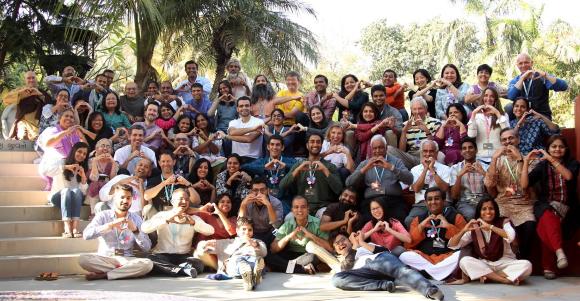
Posted by Heng Sure on Jul 31, 2017
SHARE YOUR REFLECTION
8 Past Reflections


On Feb 25, 2017 Khushmita Sanghvi wrote:
'Confucius’ method of treating all elders as if they were your own parents, and repaying their kindness with gratitude, just as if they were your own parents.'
This has stayed with me throughout along with so many other priceless gems of wisdom we received from you.
Bows and gratitude

On Mar 1, 2017 Ketan Vikamsey wrote:
It's truly a heart-rendering summation of the entire retreat and we bow to your memory of enlisting the events so accurately and warmly. I thank you for remembering my offer and I anxiously await further orders from you for our outstanding safari to a Tiger Reserve in India.
With bows and respects...



On Aug 3, 2017 Virginia May-Schiros wrote:

On Aug 5, 2017 Xiaojuan Shu wrote:



On Feb 23, 2017 Trishna Shah wrote:
Post Your Reply